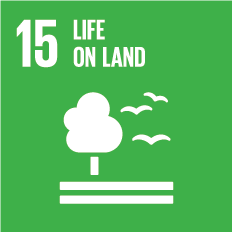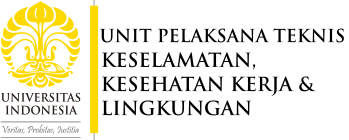
Protect, restore and promote sustainable use of terrestrial ecosystems, sustainably manage forests, combat desertification, and halt and reverse land degradation and halt biodiversity loss
Supporting land ecosystems through education
The University of Indonesia has a policy to ensure that food on campus is grown sustainably. In Chancellor’s Decree no. 4 of 2002, The University of Indonesia ensures that food on campus is obtained, produced and consumed considering the use of environmentally friendly products from sustainable agriculture. The University of Indonesia supports Law of the Republic of Indonesia Number 22 of 2019 concerning Sustainable Agricultural Cultivation Systems by ensuring that food on campus is cultivated sustainably.
Evidence link:
- Peraturan Rektor no.4 tahun 2022
https://files.ui.ac.id/f/1d2dca8a0e/
- UU no. 22 tahun 2019
Universitas Indonesia works directly to maintain and extend the existing ecosystems and their biodiversity, of both plants and animals, especially endangered ecosystems. UI is committed to maintaining plant diversity, especially endangered plants in Indonesia. UPT K3L periodically monitors and maintains endangered plants in the UI urban forest and the UI campus green open space. In addition, there will be planting of endangered plants in locations that are still available in green open spaces and replacements for fallen or dead plants. Animal monitoring in the UI Campus Environment is one of the K3L UPT Environmental Management activity in animal conservation. Activities carried out in inventorying and monitoring the diversity of fauna found within the UI Campus Environment. The animal groups observed included the taxa Aves (birds), mammals, reptiles, amphibians and fish.
Several senior teaching staff at the Department of Biology, University of Indonesia work directly to preserve and develop biodiversity in Indonesia. Some of them are Prof. Jatna Supriatna and Dr. Noviar Andayani. Prof. Jatna Supriatna is a senior lecturer at the Department of Biology, University of Indonesia, and is Chair of the Indonesian Conservation Trustees, which is a national foundation that aims to support sustainable development and preserve the environment and biodiversity in Indonesia, both land and marine ecosystems. Dr. Noviar Andayani, M.Sc. is a senior lecturer at the Department of Biology, University of Indonesia, and is Deputy Country Director of the Wildlife Conservation Society – Indonesia Program. WCS conducts applied conservation research and supports conservation projects throughout Indonesia in collaboration with various government and non-government partners.
Evidence Link :
- https://k3l.ui.ac.id/sdg-initiatives/memelihara-dan-mengembangkan-keanekaragaman-hayati-ekosistem/
- https://k3l.ui.ac.id/sdg-initiatives/pemantauan-dan-pemeliharaan-pohon-terancam-punah/
- List of SDG 14 Publication in 2022
- https://www.konservasi-id.org/pembina-dan-pengawas/jatna-supriatna
- https://indonesia.wcs.org/en-us/About-Us/Team.aspx
Universitas Indonesia (UI) offers educational programs on ecosystems (looking at wild flora and fauna) for local or national communities. UI is a campus with an area of approximately 300 hectares. Nearly 70% of the area is green open space (RTH), urban forests, and KAMPUS Lake with a variety of flora and fauna. In fact, several types of rare flora can be found in UI’s green open space and urban forests. The University of Indonesia offers ecosystem education programs to recognize and increase knowledge about flora diversity for local or national communities.
The Depok Campus of the University of Indonesia on December 8, 2022 received a visit from students from the National Plus Tunas Global School, Depok City. The purpose of this visit is to get to know and increase knowledge about the diversity of flora (plants). This activity was carried out in the East Wales City Forest section which is between the FISIP Campus and the UI KRL Station.
Evidence Link :
MBKM Program, Faculty of Public Health, University Indonesia is holding the KMMI Urban Farming Course program in partnership with modern PT East West Seed Indonesia (PT. Ewindo).
Dr.rer.nat. Yasman, M.Sc. held a community service program entitled Development of the Nucifera Creative Pondok with Integrated Coconut Utilization in Munte Village, West Likupang District, North Minahasa Regency, North Sulawesi.
The community service team (Pengmas) of the Department of Biology, Faculty of Mathematics and Natural Sciences, University of Indonesia (FMIPA UI) consists of three students, namely Bismi Yasinta Maharani, Muhammad Aqmal Danish, and Windya Fajira, and under the guidance of lecturer at the Department of Biology, Dr. Ratna Yuniati as team leader and Dr. Retno Lestari introduced a simple technology called Cocofloor, this technology aims to overcome the problem of lack of water supply
Evidence link:
- https://www.sci.ui.ac.id/upaya-mengurangi-pengunaan-pupuk-kimia-dengan-depot-pupuk-cair-oleh-departemen-biologi-fmipa-ui/
- https://cil.ui.ac.id/fkm-ui-bermitra-dengan-pt-east-west-seed-indonesia-pt-ewindo-dalam-pelaksanaan-urban-farming-course-mbkm-kmmi/
- https://www.sci.ui.ac.id/cocofloor-solusi-kekeringan-di-lahan-pertanian-desa-sembalun-oleh-departemen-biologi-fmipa-ui/
- https://www.jawapos.com/pendidikan/01416507/dari-ui-untuk-cisadon-upaya-giatkan-pariwisata-dan-ekonomi-kampung
- https://kumparan.com/windya-fajira/olah-kelapa-menjadi-produk-khas-munte-fmipa-ui-majukan-pariwisata-likupang-1z4NQPedNka/full
Supporting land ecosystems through action
Universitas Indonesia have a policy to ensure the conservation, restoration and sustainable use of terrestrial ecosystems associated with the university, in particular forests, mountains and drylands. To ensure the conservation, restoration, and sustainable use of terrestrial ecosystems, the University of Indonesia designated part of the Depok Campus area for the development of urban forests through Chancellor’s Decree No. 084/SK/R/UI/1988. The construction and development of the UI city forest aims to support education and research for the University of Indonesia as well as to collect and conserve germplasm and water catchment areas. The development, arrangement, and function of the UI City Forest are also strengthened in Chancellor’s Decree No. 2446/SK/R/UI/2016 concerning the Master Plan for the New UI Depok Campus for the 2016-2026 Period.
Evidence Link:
- Keputusan Rektor No. 084/SK/R/UI/1988 (https://files.ui.ac.id/f/8669ea09f2/)
- Keputusan Rektor No. 2446/SK/R/UI/2016 (https://files.ui.ac.id/f/8eec94845c/)
- https://k3l.ui.ac.id/sdg-initiatives/kebijakan-penggunaan-berkelanjutan-konservasi-dan-restorasi-lahan/
Universitas Indonesia have a policy to identify, monitor and protect any IUCN Red Listed species and national conservation list species with habits in areas affected by the operation of our university. The University of Indonesia identifies, inventories, and monitors flora and fauna in the campus environment. The University of Indonesia relies on the Regulation of the Minister of Environment and Forestry of the Republic of Indonesia Number P.106/Menlhk/Setjen/Kum.1/6/2018 Concerning Types of Protected Plants and Animals to identify and inventory protected flora and fauna in Indonesia and the IUCN page -Redlist for endangered flora and fauna in the campus environment. The University of Indonesia adheres to the Government Regulation of the Republic of Indonesia Number 7 of 1999 concerning the Preservation of Plant and Animal Species to protect protected and endangered flora and fauna identified in the UI Campus environment.
Evidence Link :
- Peraturan Menteri Lingkungan Hidup dan Kehutanan Republik Indonesia Nomor P.106/Menlhk/Setjen/Kum.1/6/2018 Tentang Jenis Tumbuhan dan Satwa yang Dilindungi (https://files.ui.ac.id/f/75b34c53bc/)
- Peraturan Pemerintah Republik Indonesia Nomor 7 Tahun 1999 tentang Pengawetan Jenis Tumbuhan dan Satwa (https://files.ui.ac.id/f/101092de3e/)
Universitas Indonesia includes local biodiversity in the planning and developing process, such as constructing new buildings. Universitas Indonesia’s (UI’s) urban forest is part of the campus area and has been so for more than 30 years. It was found that Universitas Indonesia’s urban forest was divided into three zones: Wales Barat, Wales Timur, and Natural Vegetation (consisted of trees from Jakarta and West Java). Universitas Indonesia’s urban forest has experienced secondary succession for a period of time, including eliminating dead trees, species enrichment throughout replanting, and invasive (fast-growing) species dispersion. In developing its physical areas, Universitas Indonesia adheres to the 2016 – 2026 Master Plan, which requires that all physical development to sustain the campus forest and conserve the local biodiversity. The building coefficient is maintained at 15%. All physical development planning is overseen by Universitas Indonesia Office of Occupational Health, Safety, and Environment.
The zoning is based on the imaginary line, which was the formed vegetation zone found by Alfred Russel Wallace and functioned as a facility for germplasm collection and conservation. Universitas Indonesia’s urban forest has experienced secondary succession for a period of time, including eliminating dead trees, species enrichment throughout replanting, and invasive (fast-growing) species dispersion. Those conditions have changed the structure of vegetation in UI’s urban forest. Reassessing the zonation of UI’s urban forest is essential. The reassessment was carried out by data inventory of replanting from 1988 to 2018 and the use of periodic inventory data. The reassessment result showed that UI’s urban forest’s zonation being a facility for germplasm collection and conservation, is not changed (has not been altered).
Evidence Link:
The University of Indonesia has a policy to reduce the impact of foreign species on campus. Invasive alien species are animals, plants or other organisms that are introduced by humans, either intentionally or accidentally, into places outside of their natural range, negatively impacting native biodiversity, ecosystem services or human economy and well-being. The University of Indonesia adheres to the Regulation of the Minister of Environment and Forestry of the Republic of Indonesia Number P.94/MenLHK/SetJen/Kum.1/12/2016 concerning Invasive Species. Efforts made to prevent and reduce the impact of invasive foreign species on biodiversity and human health are by identifying, monitoring, and evaluating as well as preventing the spread through population control. Based on monitoring and evaluation, Red Devil fish (Amphilophus labiatus) were found in all UI CAMPUS lakes with an unidentified risk level.
Evidence Link :
- Peraturan Menteri Lingkungan Hidup dan Kehutanan Republik Indonesia Nomor P.94/MenLHK/SetJen/Kum.1/12/2016 tentang Jenis Invasif (https://files.ui.ac.id/f/9835b18ff3)
- https://k3l.ui.ac.id/sdg-initiatives/kebijakan-pengurangan-dampak-jenis-asing-invasif/
Land sensitive waste disposal
University of Indonesia (UI) has water quality standards and guidelines for water discharges (to uphold water quality in order to protect ecosystems, wildlife, and human health and welfare). UI complies with Government Regulation Number 22 of 2021 concerning Implementation of Environmental Protection and Management Chapter III concerning Water Quality Management which contains national water quality standards and Regulation of the Minister of Environment and Forestry for Water Pollution Control Number 68 of 2016 concerning Waste Water Quality Standards as water quality standards . National water quality standards can be seen in Appendix VI.
The University of Indonesia follows the Regulation of the Minister of Public Works and Public Housing Number 04/PRT/M/2017 of 2017 concerning the Implementation of a Domestic Waste Water Management System as a guideline for waste water disposal.
Evidence Link:
- https://k3l.ui.ac.id/sdg-initiatives/standar-kualitas-air-dan-pedoman-pembuangan-air/
- Peraturan Pemerintah Nomor 22 Tahun 2021 tentang Penyelenggaraan Perlindungan dan Pengelolaan Lingkungan Hidup (https://files.ui.ac.id/f/2000e4a56f/)
- Baku mutu air nasional (https://files.ui.ac.id/f/155b32673c/)
- Peraturan Menteri Lingkungan Hidup dan Kehutanan Pengendalian Pencemaran Air Nomor 68 Tahun 2016 tentang Baku Mutu Air Limbah (https://files.ui.ac.id/f/e55404b46b/)
- Peraturan Menteri Pekerjaan Umum dan Perumahan Rakyat Nomor 04/PRT/M/2017 Tahun 2017 tentang Penyelenggaraan Sistem Pengelolaan Air Limbah Domestik (https://files.ui.ac.id/f/da17e02b6f/)


